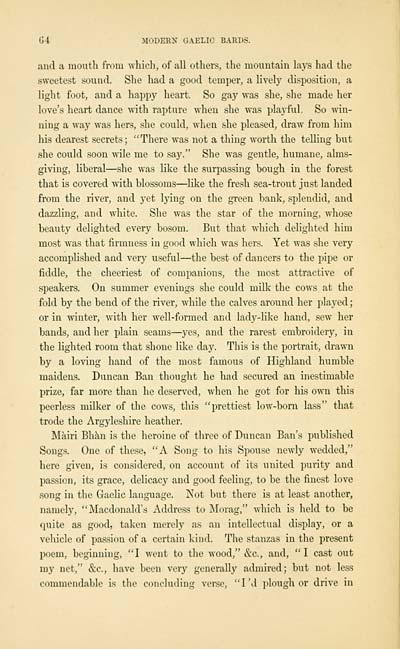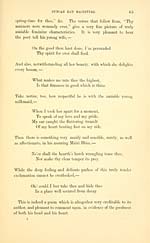Download files
Complete book:
Individual page:
Thumbnail gallery: Grid view | List view

04 MODERN GAELIC BARDS.
and a mouth from which, of all others, the mountain lays had the
sweetest sound. She had a good temper, a lively disposition, a
light foot, and a happy heart. So gay was she, she made her
love's heart dance with rapture when she was playful, So win-
ning a way was hers, she could, when she pleased, draw from him
his dearest secrets; "There was not a thing worth the telling but
she could soon wile me to say." She was gentle, humane, alms-
giving, liberal — she was like the surpassing bough in the forest
that is covered with blossoms — like the fresh sea-trout just landed
from the river, and yet lying on the green bank, splendid, and
dazzling, and white. She was the star of the morning, whose
beauty delighted every bosom. But that which delighted him
most was that firmness in good which was hers. Yet was she very
accomplished and very useful — the best of dancers to the pipe or
fiddle, the cheeriest of companions, the most attractive of
speakers. On summer evenings she could milk the cows at the
fold by the bend of the river, while the calves around her played ;
or in winter, with her well-formed and lady-like hand, sew her
bands, and her plain seams — yes, and the rarest embroidery, in
the lighted room that shone like clay. This is the portrait, drawn
by a loving hand of the most famous of Highland humble
maidens. Duncan Ban thought he had secured an inestimable
prize, far more than he deserved, when he got for his own this
peerless milker of the cows, this "prettiest low-born lass" that
trode the Argyleshire heather.
Màiri Bhàn is the heroine of three of Duncan Ban's published
Songs. One of these, "A Song to his Spouse newly wedded,"
here given, is considered, on account (if its united purity and
passion, its grace, delicacy and good feeling, to be the finest love
song in the Gaelic language. Not but there is at least another,
namely, "Macdonald's Address to Morag," which is held to be
quite as good, taken merely as an intellectual display, or a
vehicle of passion of a certain kind. The stanzas in the present
poem, beginning, "I went to the wood," &c, and, "I cast out
my net," &c, have been very generally admired; but not less
commendable is the concluding verse, "I'd plough or drive in
and a mouth from which, of all others, the mountain lays had the
sweetest sound. She had a good temper, a lively disposition, a
light foot, and a happy heart. So gay was she, she made her
love's heart dance with rapture when she was playful, So win-
ning a way was hers, she could, when she pleased, draw from him
his dearest secrets; "There was not a thing worth the telling but
she could soon wile me to say." She was gentle, humane, alms-
giving, liberal — she was like the surpassing bough in the forest
that is covered with blossoms — like the fresh sea-trout just landed
from the river, and yet lying on the green bank, splendid, and
dazzling, and white. She was the star of the morning, whose
beauty delighted every bosom. But that which delighted him
most was that firmness in good which was hers. Yet was she very
accomplished and very useful — the best of dancers to the pipe or
fiddle, the cheeriest of companions, the most attractive of
speakers. On summer evenings she could milk the cows at the
fold by the bend of the river, while the calves around her played ;
or in winter, with her well-formed and lady-like hand, sew her
bands, and her plain seams — yes, and the rarest embroidery, in
the lighted room that shone like clay. This is the portrait, drawn
by a loving hand of the most famous of Highland humble
maidens. Duncan Ban thought he had secured an inestimable
prize, far more than he deserved, when he got for his own this
peerless milker of the cows, this "prettiest low-born lass" that
trode the Argyleshire heather.
Màiri Bhàn is the heroine of three of Duncan Ban's published
Songs. One of these, "A Song to his Spouse newly wedded,"
here given, is considered, on account (if its united purity and
passion, its grace, delicacy and good feeling, to be the finest love
song in the Gaelic language. Not but there is at least another,
namely, "Macdonald's Address to Morag," which is held to be
quite as good, taken merely as an intellectual display, or a
vehicle of passion of a certain kind. The stanzas in the present
poem, beginning, "I went to the wood," &c, and, "I cast out
my net," &c, have been very generally admired; but not less
commendable is the concluding verse, "I'd plough or drive in
Set display mode to: Large image | Transcription
Images and transcriptions on this page, including medium image downloads, may be used under the Creative Commons Attribution 4.0 International Licence unless otherwise stated. ![]()
| Early Gaelic Book Collections > Blair Collection > Selections from the Gaelic bards > (88) |
|---|
| Permanent URL | https://digital.nls.uk/75750846 |
|---|
| Description | A selection of books from a collection of more than 500 titles, mostly on religious and literary topics. Also includes some material dealing with other Celtic languages and societies. Collection created towards the end of the 19th century by Lady Evelyn Stewart Murray. |
|---|
| Description | Selected items from five 'Special and Named Printed Collections'. Includes books in Gaelic and other Celtic languages, works about the Gaels, their languages, literature, culture and history. |
|---|

